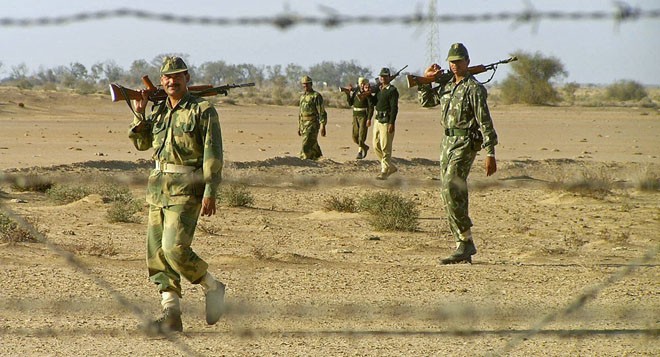

As the government and opposition finally agree to sit together in the coming weeks to incorporate suggestions from different political parties before passing a new counter-terrorism law, the Protection of Pakistan Ordinance (PPO), human rights defenders and civil society activists feel that by such a law may still be open to abuse.
This apprehension is based on the past behaviour of security forces in the country that have repeatedly been involved in acts of basic human rights violations.
Earlier this month, on April 7, the government bulldozed the law through the National Assembly, despite strong protests and walkout staged not only by the opposition but even those allied with the Pakistan Muslim League-Nawaz (PML-N), the current ruling party. But as per the rules, the party has to present it in the Senate, where it doesn’t currently enjoy a majority -- and hence will have to give in to the demands of the opposition.
"We are not going to let it pass in the current form. It has several clauses, which not only violate human rights but also give unchecked powers to the security forces," says Senator Afrasiab Khattak, who belongs to the Awami National Party (ANP) and is also heading the Standing Senate Committee on Human Rights.
According to Khattak, the opposition had planned to let the bill come for discussion and then try to force the government to incorporate the amendments they had in mind.
"Among other issues - the law puts the burden of proving innocence on the accused. That is against universal jurisprudence. Also, keeping someone in custody for 90 days violates the fundamental rights of any individual," Khattak says, pointing to the fact that most of those involved with formulating this law for the government did not see its implications because of a lack of political acumen. "Through such other laws in past, there has been political victimisation. And that is a dangerous thing, not just for those of us in opposition but even for those in power, because today if its being used against us, tomorrow it could be used against them," he adds.
However, those in the government quarters say that since the country is going through an insurgency and a spate of terror acts, there is need to enact such a law to deal with terrorists. "We are not going to go after common people and abuse their rights through this law. It is going to ensure that we are able to punish terrorists," says Rafiq Rajwana, a PML-N senator.
Rajwana is hopeful that after the recent Nawaz-Zardari meeting this week, the law will be enacted soon. "We need to think about the rights of those who were killed by terrorist activities. I am a big proponent of human rights. For me, the families of those who have been killed need to see justice and this law can ensure that," he adds.
Pakistan has been facing the problem of violence by religious extremists for many years now, which observers feel has resulted from a blowback of Pakistan’s security policy that focuses on supporting jihadi outfits operating on Pakistani soil. Through these outfits, the Pakistani state has ensured its interference and influence in regional conflicts, but such a policy has given birth to a homegrown insurgency.
What is more surprising is that Pakistani government is currently engaged in a peace dialogue with terrorist groups, while it wants to pass a law that it claims is to counter terrorism in the country.
Activists feel the inability to tackle the issue of terrorism is not because there is an absence of laws, since many such legislations like the existing penal code, the Anti-terrorism Act, the Security of Pakistan Act, Maintenance of Public Order Ordinance, Defence of Pakistan Rules etc. are already in practice.
"Pakistan military seems to be forcing the government to introduce this draconian law. The army has been facing considerable pressure from the courts with the issue of missing persons and the internment centres across Pakistan, and especially in the Khyber-Pakhtunkhwa province, where hundreds of Pakistanis are being kept in custody by the military without any legal relief for them," says Zaman Khan, a representative at the Human Rights Commission of Pakistan.
Khan feels that enacting new laws alone will not solve the problem of terrorism. "We need to change the way Pakistani society is groomed. We need to make concerted effort at addressing terrorism-related issues," he adds.
HRCP, which has strongly criticised the law that currently exists in the form of an ordinance passed in October 2013, has called a meeting of activists at the end of this month where different civil society members will launch a country-wide awareness campaign to stop this law from being passed in its existing form.
However, Khan welcomed the recent decision of the government to review the law and involve other political parties in the process. "We hope that these new changes are not cosmetic. The opposition in the parliament needs to be careful about that," he says.
Human rights defenders also feel that the law contradicts with the constitution and, therefore, may be struck down by the Supreme Court, the institution tasked with interpretation of law. "Giving limitless powers to security forces and enacting such a law for three years will allow the security forces to do whatever they like, wherever they like. That is unacceptable. Of course, there have been other countries that have made similar legislations but there are always checks and balances. We need to ensure there are adequate ones in place before passing such a law," he adds.